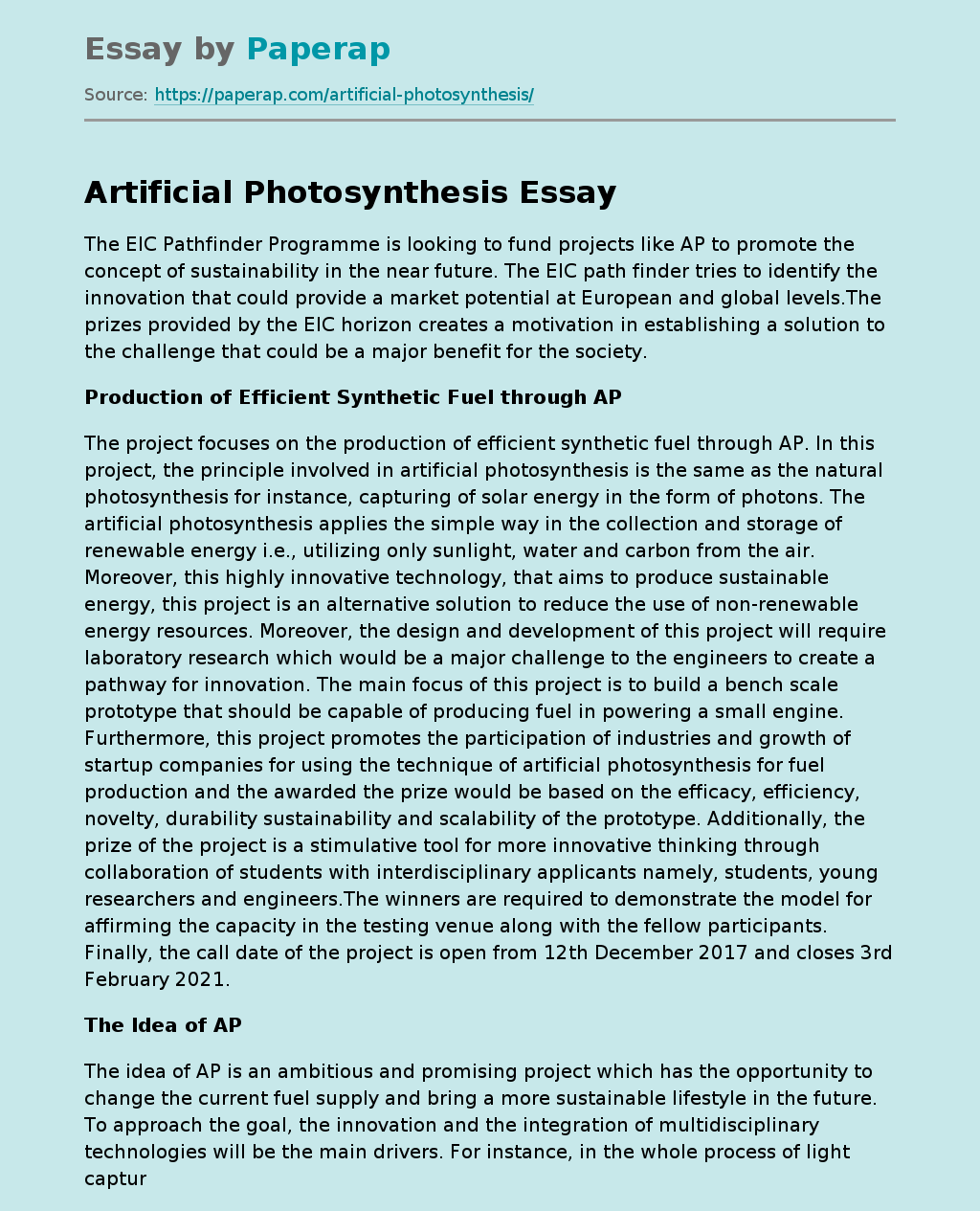Artificial Photosynthesis
The EIC Pathfinder Programme is looking to fund projects like AP to promote the concept of sustainability in the near future. The EIC path finder tries to identify the innovation that could provide a market potential at European and global levels.The prizes provided by the EIC horizon creates a motivation in establishing a solution to the challenge that could be a major benefit for the society.
Production of Efficient Synthetic Fuel through AP
The project focuses on the production of efficient synthetic fuel through AP.
In this project, the principle involved in artificial photosynthesis is the same as the natural photosynthesis for instance, capturing of solar energy in the form of photons. The artificial photosynthesis applies the simple way in the collection and storage of renewable energy i.e., utilizing only sunlight, water and carbon from the air. Moreover, this highly innovative technology, that aims to produce sustainable energy, this project is an alternative solution to reduce the use of non-renewable energy resources.
Moreover, the design and development of this project will require laboratory research which would be a major challenge to the engineers to create a pathway for innovation. The main focus of this project is to build a bench scale prototype that should be capable of producing fuel in powering a small engine. Furthermore, this project promotes the participation of industries and growth of startup companies for using the technique of artificial photosynthesis for fuel production and the awarded the prize would be based on the efficacy, efficiency, novelty, durability sustainability and scalability of the prototype.
Additionally, the prize of the project is a stimulative tool for more innovative thinking through collaboration of students with interdisciplinary applicants namely, students, young researchers and engineers.The winners are required to demonstrate the model for affirming the capacity in the testing venue along with the fellow participants. Finally, the call date of the project is open from 12th December 2017 and closes 3rd February 2021.
The Idea of AP
The idea of AP is an ambitious and promising project which has the opportunity to change the current fuel supply and bring a more sustainable lifestyle in the future. To approach the goal, the innovation and the integration of multidisciplinary technologies will be the main drivers. For instance, in the whole process of light capture to the production of the fuel not only require the knowledge in bio-mimicking, nanotechnology and the physical chemistry but also rely on the combination of these systems to put the prototype into practice.
In addition to the technology aspect, the feasibility of AP in the market scale is another facet that needs to be considered. The innovation can stimulate interests from industries, facilitating further investment and development to the project. Thus, the cooperation between industries and academic research is pivotal to the efficiency of the process.
Inducement prize will be the main action to award participants in this case. The partnerships of the project can be separated into two groups and the first one is the academic research organizations. MINDS & SPARKS GMBH is an experienced research institution which is composed of a team of researchers, engineers and developers. One of the resources MINDS & SPARKS GMBH can provide is the assessment of Innovation and Technology Market Solution, and this assessment will be highly related to the future planning of the AP project. The second group will be the small or medium-size enterprise. LIONEX GMBH is a growing company that focuses on the application of biotechnologies and with the specialty in microbiology, biochemistry and bioinformatics. In addition, the DPL Industri A/S is looking for a partner who specializes in ‘from microalgae to fuel’that we believe the research domain is quite similar to the concept of AP.
In the timeline schedule, we expect the collecting of partners may take 6 months since partners we found are scattered in different countries. Furthermore, the proposal writing process may need 8 months which should take the technical feasibility and marketing strategies into consideration. The experiment and application process requires the integration of various professionals and may take up to 3 months and need additional 3 months for the result. Thus, in total from the concept to the prototype roughly takes about 20 months.
Artificial Photosynthesis. (2021, Nov 16). Retrieved from https://paperap.com/artificial-photosynthesis/

